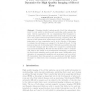Free Online Productivity Tools
i2Speak
i2Symbol
i2OCR
iTex2Img
iWeb2Print
iWeb2Shot
i2Type
iPdf2Split
iPdf2Merge
i2Bopomofo
i2Arabic
i2Style
i2Image
i2PDF
iLatex2Rtf
Sci2ools
MICCAI
2009
Springer
2009
Springer
A Fast Alternative to Computational Fluid Dynamics for High Quality Imaging of Blood Flow
Obtaining detailed, patient-specific blood flow information would be very useful in detecting and monitoring cardio-vascular diseases. Current approaches rely on computational fluid dynamics to achieve this; however, these are hardly usable in the daily clinical routine due to the required technical supervision and long computing times. We propose a fast measurement enhancement method that requires neither supervision nor long computation and it is the objective of this paper to evaluate its performance as compared to the state-of-the-art. To this purpose a large set of abdominal aortic bifurcation geometries was used to test this technique and the results were compared to measurements and numerical simulations. We find that this method is able to dramatically improve the quality of the measurement information, in particular the flow-derived quantities such as wall shear stress. Additionally, good estimation of unmeasurable quantities such as pressure can be provided. We demonstrate th...
Aortic Bifurcation Geometries | Medical Imaging | MICCAI 2009 | Patient-specific Blood Flow | Patient-specific Flow Simulations |
| Added | 06 Nov 2009 |
| Updated | 08 Dec 2009 |
| Type | Conference |
| Year | 2009 |
| Where | MICCAI |
| Authors | Robert H. P. McGregor, Dominik Szczerba, Krishnamurthy Muralidhar, Gábor Székely |
Comments (0)

